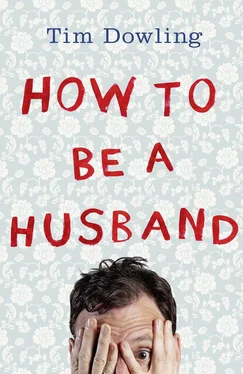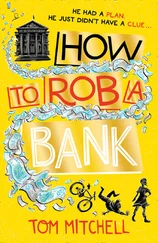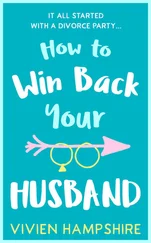‘Christ.’
‘Don’t say Christ,’ I say. ‘Not in there.’
In fact Father Jim is welcoming, kind and prone to reward a half-hour’s earnest chat with an extremely strong gin and tonic. Our meetings with him are the only time we ever discuss topics including love, commitment, children and, more generally, the future with anyone. My wife-to-be, who has virtually no experience of religion and is therefore free to take from it what she wishes, finds it all rather bracing. For me, Catholicism remains an unfinished school assignment, a dropped subject. I sweat a lot during these meetings, but I am grateful that someone took the time to impress upon us the seriousness of the whole undertaking.
Father Jim is not the only person we have meetings with, though. We have meetings about flowers, about venues, about food, booze, music and printed invitations. I’d somehow imagined that our whirlwind engagement might relieve us of some of the stresses associated with a big wedding, but it just means we have to do the same stuff faster. We do have engagement photos taken – I look like a frightened potato in them – and our pending nuptials are announced in a national newspaper. It’s going to look terribly convincing, this sham marriage we’ve hastily arranged just so we can stay together for ever.
I am prone to nightmares in which I find myself back at school or still in college, suddenly facing the prospect of sitting a final exam for a class I signed up for but never attended, taught by a teacher who would not recognize me (they may be dreams, but they’re based on true stories). At the point where the full consequences of my unpreparedness are about to be made plain I wake up and discover, to my immense relief, that I am middle-aged, and therefore closer to the sweet release of death than I am to tenth-grade chemistry.
Waking on my wedding day, the reverse happens: I had been dreaming of mundane things, only to open my eyes and find myself in a foreign country where I’m about to get married. My life’s greatest test to date is scheduled for 11.30 a.m., and I could not be less ready.
I have borrowed a dark blue suit from my friend Bill, without trying it on first. He’s much taller than me; the trousers, it transpires, are three or four inches too long. Only the night before, my friend Jennifer had had to come round and staple new hems into place. I need to step into the trousers very gingerly in the morning to avoid undoing her work.
My memory of the next four or five hours is dangerously unreliable, and full of blank spots. It’s a good thing there are pictures. My imminent wife and I spent the night apart – she at her mother’s, me in the flat. I don’t remember meeting up the next morning outside Chelsea Register Office at all; only the part where I watched her write out a cheque to cover the cost of the ceremony in a back office. I remember stepping from the office into a venue area – a big sitting room, really – crammed with about forty people I either knew or was related to, and trying not to catch anyone’s eye. I recall a bit of the rigorously bland language in the vow I recited: ‘I do solemnly declare that I know not of any lawful impediment why I, Robert Timothy Dowling, may not be joined in matrimony to …’ I was basically petitioning to get married because I could not think of a solid legal reason to stop myself.
A lunch follows the ceremony, followed by a big party in a pub and a night in a posh hotel. The first real test of our marriage doesn’t come until the next morning, when we have to get married again. After getting to bed at about 4 a.m., I am up and waiting for a taxi at 7.30. My Catholic wedding is at ten, and by prior arrangement I am attending the preceding mass with my family. My wife is to arrive later for the ceremony. I am badly hungover, nervous and shaking. I am in no fit state to get married and, had I not already been married, I might have got cold feet. But I didn’t. Reader, I married her, again. I married the shit out of her.
The next day, we fly to Naples. It seems odd to leave behind such a large collection of normally far-flung friends, relatives and in-laws – an assemblage that will never recur – while they’re all having fun in London, but we need to go on honeymoon. It’s booked, and more importantly, I can only apply for Indefinite Leave to Remain from outside the UK. We are leaving the country so I can get back in.
Our priority in Naples is a visit to the British vice-consul, the only man in the area with the authority to approve my re-entry into the UK, excepting, I suppose, the consul. We turn up with our marriage certificate, some required paperwork and a selection of specially taken Polaroid wedding photos, and we are prepared to hold hands if it will help. The vice-consul waves away our photos, signs our papers and gives us tea. He regards our case as a welcome distraction, he says, from his regular duties, which seem to revolve largely around repatriating penniless students. The business is completed in under an hour. The remaining nine days of our honeymoon on the Amalfi coast stretch uncertainly before us.
In the days when couples had tightly restricted access to one another before the wedding, a honeymoon made sense. If you’ve already spent two years living in a tiny flat together, the honeymoon does not coincide with the honeymoon period. Nine days seems like an awful lot of enforced togetherness, especially when you’ve just embarked upon a project that quietly terrifies you both.
As a young married couple in a foreign country, you feel not just alone but positively quarantined, strolling through the unfamiliar streets of Positano together like two people who share a rare disease. It might well prove an instructive and reinvigorating break from the day-to-day drift of an established relationship, but ten days into a marriage is not a good time to discover you’ve run out of conversation. Under the circumstances, we do the only sensible thing: we run out of money instead.
In hindsight we could have blamed a lack of preparation, but what really happened amounted to a failure of leadership. Whenever we’d been together in America I’d invariably made the arrangements. In London my wife had organized everything while I watched, agog, as if my life were happening in a museum.
On neutral territory, however, neither of us takes charge. Nobody keeps proper count of the cash, tots up the receipts, or attempts to square our spending with the number of days left. The exchange rate is often discussed, but never quite mastered. Perhaps we both feel that the hard-nosed financial pragmatism a marriage requires shouldn’t start until after the honeymoon ends. As a team we prove to be both indecisive and extravagant, switching hotels on a whim, hiring boats without checking the price and ordering expensive drinks on the beach. We had been gifted a tidy pile of cash as a reward for getting married, but it runs through our fingers without us even feeling it. This is before – right before – it was possible to put your bank card into a cash machine anywhere in the world and receive handfuls of the local money. In 1992 that sort of preposterous convenience is still a far-off dream. Even a bank wire transfer takes three days.
Somehow, with two days to go, we wake up in a hotel on Capri with the equivalent of £30 in lira between us. It is not enough to pay the bill we’ve run up already. In fact it is only enough for one of us to take the boat back to Naples to beg some money from the only person we know there.
‘You have to go,’ I say to my wife, bravely. ‘He’s your vice-consul.’
‘I’ll be back,’ she says. ‘Don’t eat anything.’
So I sit in a room I cannot check out of because I cannot settle the bill, wondering if I’ll ever see my wife again. It occurs to me that Naples is not the sort of city to which one sends a woman alone on an errand. If anything happens to my wife I will have to live with the guilt. I have an urge to go after her, but then I remember I don’t have the money to cross the bay. I am paralysed by worry, although my mind somehow finds the wherewithal to ask itself whether a dip in the pool might help.
Читать дальше












